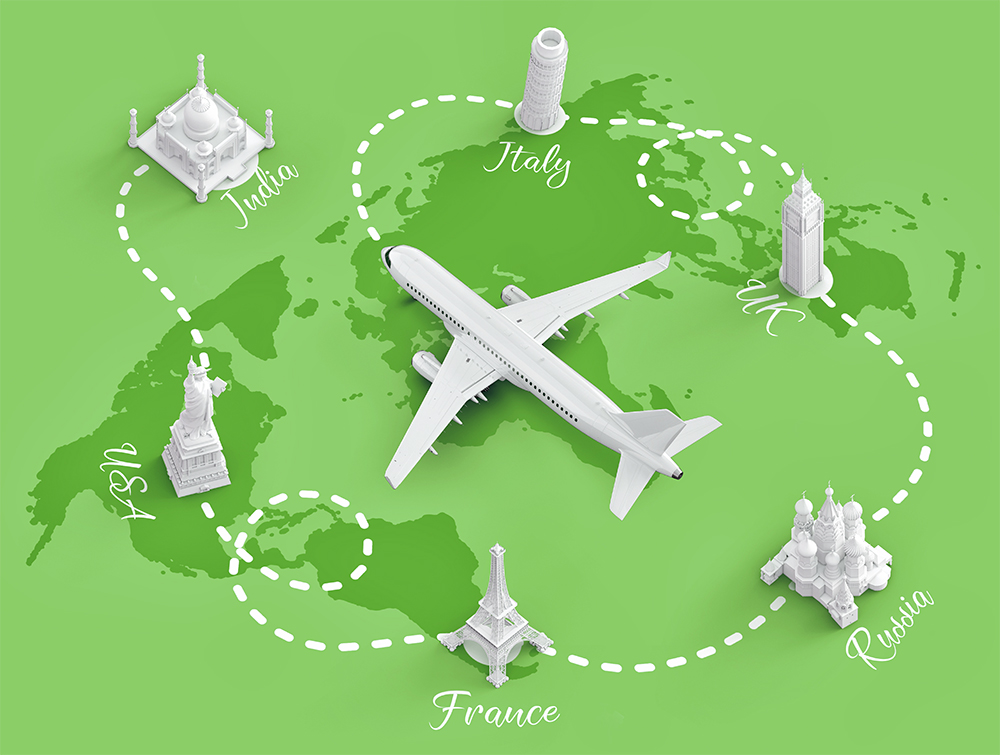
Editor's note: This story ran in our April issue, as it was being written, the pandemic was just unfolding.
As the travel industry grapples with a shifting landscape created by the coronavirus outbreak, the resulting closures of tourist attractions and increasing travel restrictions, agents are hard at work helping their clients.
The effect this will have on travel agencies remains to be seen but for those with decades in the industry, having gone though other pandemics, recession and even Sept. 11, agents are used to dealing with unexpected challenges and say they are ready to help clients navigate the crisis.
While online booking may promise the lowest rate, a travel agent with a long-standing relationship with a resort may be able to do better.
As agents work feverishly to manage changes, users of online sites are often met with busy signals and bogged-down servers with boilerplate statements telling them not to call to rebook unless their trip is in the next few days.
When Disaster Strikes
Wildfires, earthquakes and outbreaks have all affected travel in recent years. “SARS, MERS, H1N1, we’ve seen it all,” says Karen Jenkins, manager at Seabrook Travel. She says clients traveling later this year are hitting the pause button for now and taking a wait-and-see attitude.
Managing these situations and protecting a vacation that is already planned and paid for is where an agent’s network and knowledge can be invaluable. As the impact of COVID-19 spreads, agents are helping travelers decide when or how to change their plans.
Jenkins says they are following the CDC guidelines, which spell out what type of travel is appropriate and what travelers can expect on their return.
For many of these agents, this isn’t their first crisis, says Kathy Burns Lamphier, owner of Posh Travel in Greenland, who had many clients affected by the Australian wildfires. “We were working 14-hour days getting people re-accommodated. It was hard for them and hard for us. One of the luxury hotels burned down, which was heartbreaking.”
In 2009 a volcano in Iceland spread ash across the skies over Europe. “You could not fly east to west. All these people were stranded,” says Burns Lamphier. “I was in Mexico City on my laptop trying to help a client get home from India. He had to go by way of China.

Kathy Burns Lamphier, owner of Posh Travel, picking tea in Guilin, China. Courtesy photo.
As the coronavirus elevated to a pandemic, Burns Lamphier says her team is back to working 14-hour days. “This week has been very difficult; most people are putting their plans on hold. They’re not getting refunds, they are just delaying.”
After the Sept. 11 attacks, agents had calls coming in from across the country as people tried to get home, says Mary Ellen Lessard, travel consultant for AAA Northern New England. For people who booked online there isn’t much they can do.
Even now, during the pandemic, Lessard says they are fielding member calls and doing what they can, but there are more questions than answers as airlines make changes to schedules and ticketing policies almost daily, and international visa offices are shut down.
Problems can also arise before a traveler leaves the ground. One of Lessard’s clients traveling at Christmas, was in a predicament when many TSA workers failed to report to work. She says people were missing flights with little hope of rebooking so close to the holiday. “I helped them with their tickets while they were in the a long line to rebook at the counter,” she says. “By the time they got to the end of the line that flight was sold out. But I was able to get them on it.”
Still Standing
The internet was supposed to be the death of travel agencies. And it has certainly tried. According to the U. S. Department of Labor Bureau of Labor Statistics (BLS), there are about 70,000 travel agents nationwide—a number that plummeted by more than 50,000 since 1990.
But, despite dire predictions, there are still more than 15,000 travel agencies nationwide that are surviving through customer service, creativity and comps.
Some travel agencies are not only enduring but thriving. On the list of the Top Women-Led Businesses in NH featured in the October issue of Business NH Magazine, Posh Travel clocked in at #35 and Mickey Guru Travel Company, a Merrimack agency that launched in 2014 specializing in Disney vacations, ranked #48. Mickey Guru was also among the five fastest growing companies on the list.

Eric and Kristy Ouellette of Mickey Guru. Courtesy photo.
“I’m lucky I weathered all the changes,” says Burns Lamphier. “When I opened 31 years ago, there were 25 other agencies within a 30-mile radius.” That has dropped to around four today, she says.
Burns Lamphier says people are coming back to travel agencies as they become overwhelmed with the online options. “They never 100% went away, they just left for a while to tinker,” she says.
Seabrook Travel, which just marked 35 years in business, has moved to niche travel, such as destination weddings and adventure travel to exotic locations, says Jenkins, who has been with the firm for 21 years. “We had to change,” she says. “Corporate travel was big money. You got 10% [commission] from the airlines and commission on hotel and rental cars. But airlines no longer pay commission so agencies have to charge fees; we cap ours at $30, but many are charging $50 to $75. We feel bad that we even have to charge a fee.”
It is not uncommon for people to use travel sites and an agent, especially when they get into trouble. “They will call us and ask what to do after they hit the wrong button,” Burns Lamphier says. “They forgot to allow for the international dateline and are now scheduled to arrive on the wrong day. Our tagline is, ‘without a travel agent, you’re on your own.”’
Just as they do for roadside assistance, AAA has 24-hour support and often comes to the aid of members who start their trip planning online, says Lessard. “I had a gentleman come in because the name on his ticket didn’t match his passport. They were not going to let him on the plane,” she says.
“Sometimes everything looks good when you book online, but what looks like a stopover may have you overnighting in a country you’re not familiar with and don’t have a reservation in.”
The Personal Touch
Many agents say what keeps them in business is their ability to use their extensive knowledge to create a personalized experience for clients. “The real trip joy is the destination, picking the hotel that is just the right fit for the customer. It’s a talent,” Burns Lamphier says.
Lessard says clients can access much of the same information available online, but she has the expertise to avoid pitfalls. She adds she can incorporate her knowledge of a client to select transportation and hotels that best suit their needs.
“We know all the ins and outs, like a better airport closer to the client…we are travelers ourselves.”
Jenkins says while destination weddings are popular, they are not easy to plan oneself. A travel agent will have a much easier time getting wedding participants from multiple locations to the resort.
Seabrook Travel offers a bridal registry where guests can pitch in for the honeymoon instead of buying a gift. “Plenty of couples who live together already have a toaster oven,” Jenkins says. “This way, they can get their honeymoon paid for.”
Travelers are interested in gastro-tourism, international wine and brewery tours, and more remote and exotic destinations, which agents say is an opportunity to put their skills to the test and provide new services.
“When you book on Expedia, you’re getting what they call distressed space,” says Burns Lamphier. “It can be the worst room in the house. When we book—not at the Expedia rate, mind—all it takes is an email to the hotel general manager and you find yourself with an upgraded room and a bottle of wine.”
Burns Lamphier says her agency is part of the Virtuoso Network, a global network specializing in luxury and experiential travel, where they are fond of the expression, “We’re the best new thing that never went away.”
Studying Abroad
Experiencing the destination firsthand is an important part of the training. While national chains and larger agencies may have formalized programs, for the most part traditional travel schools have faded into memory.
“When I became a travel agent there were travel schools, but no more,” says Lessard. “At AAA, we have our own travel training program.”
Jenkins says, she too, went to a travel school but now conducts training in house. Most agents also take advantage of so-called “Fam” trips to familiarize themselves with the amenities.
Burns Lamphier says she urges all her agents to travel and write up their experience to share with the team. She has flown to Europe for as little as four days for the chance to see a newly opened or renovated hotel.
“Traveling is a very important part of what we do…but we are not on vacation. I was in New Zealand for 12 nights and stayed in 10 hotels, living out of suitcases the whole time,” she says. “You stay one night, pack up the next day, do a site inspection, eat dinner in the restaurants. Sight-seeing is from the car between points A and B.”
At press time, Burns Lamphier was off to Africa for eight days at six resorts and says she will be ready to share her knowledge when her clients are ready to go.
